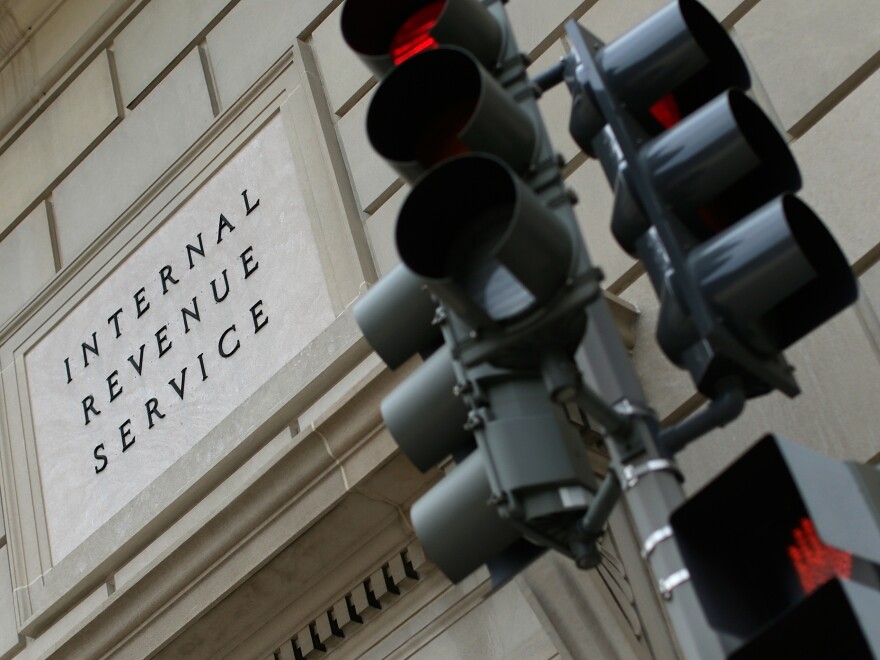Like other Americans, inmates and their families are struggling financially. CARES Act stimulus payments for inmates, which were granted after a legal challenge, help offset the myriad expenses inmates are responsible for, like telephone calls or medical needs.
The first payments were by check, but state prisons have been unable to process the second round of stimulus payments because the IRS distributed the money using debit cards.
Corrections Departments in Arizona, California, Florida, New Mexico and New York all report receiving the cards for inmates who qualify CARES Act payments. The states have communicated the problem to the IRS, but it's unclear what steps the federal agency will take to fix it.
Stephen Karban is an inmate at the state prison in Florence, Ariz. Reached via email, he said prison officials told him the debit cards would be "sent to inmate banking to maintain in a safe pending a conversation with the IRS to determine how to return the debit cards and have the IRS issue checks."
When Karban asked why the money could not be released to his family, he said prison officials told him: "all debit cards will be returned to the IRS for checks. We do not get notified of who checks or debits checks were received for. You will need to contact your family/friends on the outside to look into this for you."
Most inmates have a prison account that they draw from, often depositing earnings from prison jobs. But the pandemic shut those jobs down. For safety and social distancing, inmates are limited to certain areas.
Karban said while most prisoners have lost their incomes, their expenses haven't stopped.
"If dental care is needed, the prisoner must pay," he said. "If the prisoner has no money, he or she still receives treatment, but goes into debt. Legal copies are made and legal mail is sent. And the prisoner goes further into debt."
Karban said getting access to the second stimulus payment would help with those costs.
But there isn't a lot the Arizona Department of Corrections can do, said spokesperson Bill Lamoreaux.
"Whether or not an inmate has received or will receive a CARES Act payment is an issue between the inmate and the IRS," he said.
"Many inmates received the first round of stimulus payments via a check. However, the second round of stimulus payments are via a debit card. The IRS is aware that many state departments of corrections are unable to process debit cards and has indicated that it is working on a solution, the receipt of which is uncertain."
Spokespeople for departments of correction in New York, Florida, New Mexico and California all acknowledged via emails the challenges posed by the debit card payments. Most have had to send the cards back to the IRS, and have asked for paper check payments.
"We are working closely with the IRS to provide the payments in a way that they may be properly applied to an inmate's trust account," said Alia Cruz, a spokesperson for the California Department of Corrections and Rehabilitation.
The IRS did not return multiple requests for comment.
A spokesperson for the Bureau of Prisons refused to confirm or deny that any inmates at federal facilities have received stimulus payment debit cards from the IRS.
Yaman Salahi, a partner at the San Francisco-based law firm Lieff Cabraser Heimann & Bernstein, said his office gets hundreds of calls and emails every week from incarcerated people around the country and their families who are trying to secure federal stimulus payments.
After the CARES Act was passed in March 2020, the IRS determined incarcerated people were not eligible for stimulus payments.
Salahi's firm filed a class action lawsuit that successfully challenged the IRS's policy, and the government eventually dropped an appeal to the lawsuit in December. But Salahi said it is still very difficult for incarcerated people to receive payments.
"Incarcerated people are amongst the least-able to jump over all the hurdles and overcome all the barriers that have been placed in the way of trying to get these payments," he said. "They are required to somehow obtain tax forms, which are usually not available in prisons, figure out how to fill them out without the assistance of professionals, mail them in, and then receive the payment."
Salahi said getting the payments into inmate bank accounts has been a significant challenge.
"This issue with debit cards is consistent with a pattern of the IRS failing to work with state correctional authorities to ensure that stimulus payments are reaching the people they are supposed to reach," Salahi said. "We would hope that, given what happened with the first round of payments, they would have given more forethought to this and more attention to the issues that are unique to prison."
Copyright 2021 KJZZ. To see more, visit . 9(MDAxODc1NzUzMDEyMTgyMjc0NzUxZmVhMQ004))


